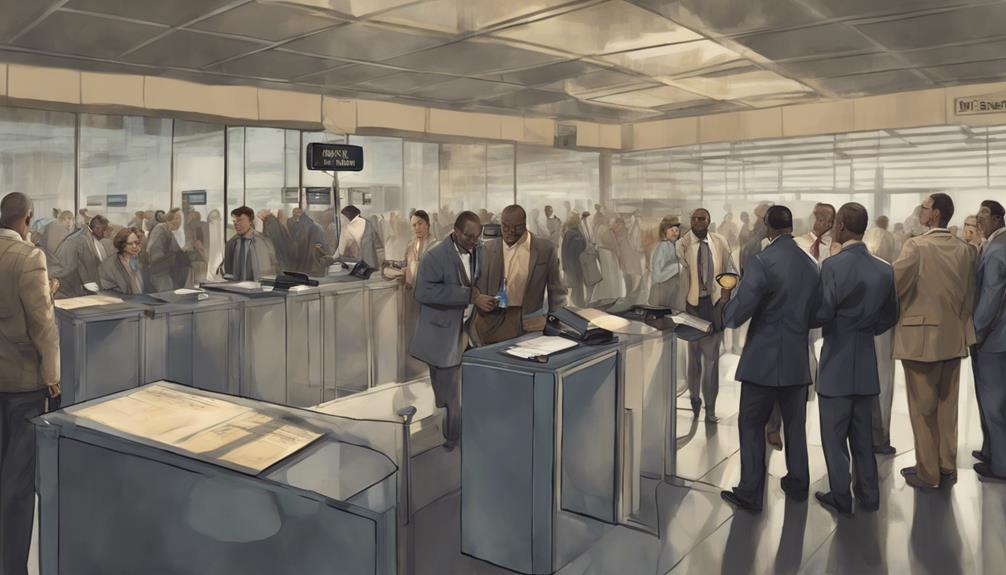Misdemeanors can show up on background checks, potentially impacting one's employment prospects. Employers may consider factors like the nature and recency of the offense when evaluating candidates. Transparency about past misdemeanor charges is important for building trust during the hiring process. Understanding the implications of misdemeanors on background checks is necessary for job seekers. This knowledge can help individuals navigate the challenges of job applications and make informed decisions about their criminal records.
Key Takeaways
- Misdemeanors can show up on background checks.
- Visibility depends on the thoroughness of the check.
- Driving-related misdemeanors like DUIs are more likely to appear.
- Older misdemeanors may not always be included.
- Full disclosure is crucial for transparency in the hiring process.
Impact of Misdemeanors on Employment

When considering job opportunities, individuals with misdemeanors on their record may encounter challenges due to the potential impact on their employability. Misdemeanors, categorized as less severe criminal offenses, can surface during pre-employment background checks, influencing employers' decisions.
The presence of a misdemeanor on one's record can raise concerns for employers regarding the individual's past criminal activity and their suitability for the position. Employers often weigh factors such as the nature of the misdemeanor, the time elapsed since the offense, and the responsibilities associated with the job when evaluating its relevance to the employment opportunity.
While some industries may be more lenient towards older misdemeanor charges, especially if they're unrelated to the job role, certain sectors maintain strict standards concerning any criminal history. Transparently addressing misdemeanor charges during the hiring process is essential since employers generally prefer candidates with clean records.
Despite potential options for deletion or sealing of misdemeanor records in Texas, individuals must navigate the impact of such charges on their employment prospects.
DWI and Employment in Texas
How does a DWI charge impact employment opportunities in Texas?
In Texas, a DWI charge is considered a misdemeanor and will appear on a person's criminal record indefinitely. Employers in Texas typically prefer candidates with a clean criminal record, making it challenging for individuals with a DWI conviction to secure employment.
While it's possible to have DWI charges expunged or sealed through legal processes, these options aren't always accessible or successful.
Background checks in Texas are thorough, and misdemeanor DWI convictions are likely to show up, potentially affecting job prospects. Employers may view a DWI conviction as a red flag for issues related to responsibility and reliability, particularly in roles that involve driving or handling sensitive information.
Individuals with a DWI on their record may need to address this issue proactively during the hiring process and provide context or evidence of rehabilitation to mitigate concerns about their suitability for employment.
Strategies for Passing a Background Check

Employing transparency and showcasing rehabilitation efforts can enhance an individual's chances of passing a background check despite a misdemeanor offense on their record. When facing criminal background checks, it's crucial to be forthright about the misdemeanor charge and provide context to demonstrate personal growth and responsibility. Highlighting rehabilitation efforts, such as completing counseling or community service, can further demonstrate efforts towards positive change.
In addition to honesty and rehabilitation, obtaining character references from employers, colleagues, or community members can help portray positive attributes and credibility. It's also beneficial to emphasize any favorable aspects of your background, such as education, work experience, or volunteer work, to present a well-rounded profile.
For individuals with a misdemeanor on their record, exploring options for having the offense sealed or expunged can markedly improve their chances of passing a background check. Seeking expungement, if eligible, can effectively remove the misdemeanor from the record, further reinforcing efforts towards rehabilitation and a clean background.
Real-Life Examples and Expert Insight
Legal experts like attorney Dmitry Gorin offer valuable insights on handling the impact of misdemeanors on background checks, shedding light on practical strategies for individuals facing such challenges. Understanding the implications of having a misdemeanor on one's record for life is essential, especially when it comes to job applications.
Law firms like Eisner Gorin LLP, with a focus on criminal trial work and pretrial litigation, can provide expert guidance on navigating the complexities of criminal convictions, particularly those deemed less serious.
Real-life examples highlight the significance of addressing past criminal records during the job application process. These instances underscore the importance of seeking legal advice to understand one's rights post-sealing of a criminal record.
Understanding Criminal Offenses

Misdemeanors encompass a range of offenses that are considered less serious than felonies but can still have significant consequences. Understanding the visibility factors of misdemeanors on background checks, what they entail, and how they can impact job prospects is essential for individuals maneuvering the legal system.
Knowing the inclusion of misdemeanors in background checks and the potential repercussions on future employment opportunities is vital for making informed decisions.
Misdemeanor Visibility Factors
The visibility of misdemeanors on background checks can vary depending on the thoroughness of the check conducted and the jurisdictions included in the search. Misdemeanors are minor criminal offenses that may or may not appear on a background check based on various factors. Below is a table outlining some key factors influencing the visibility of misdemeanors:
| Visibility Factor | Influence | Example |
|---|---|---|
| Type of Background Check | Determines the depth of the search and whether misdemeanors will show up | A basic check might not reveal misdemeanors |
| Jurisdictions Included | The presence of misdemeanors can differ based on the areas covered in the background check | Misdemeanors in a specific county may be missed |
| Pending Criminal Charges | Ongoing cases might not be reflected in a background check until they are resolved | A pending misdemeanor might not be visible |
Background Check Inclusions
Visibility of criminal offenses on background checks can vary depending on the thoroughness of the search conducted and the specific jurisdictions covered. Background checks typically encompass a review of an individual's criminal records, which can include misdemeanor offenses.
Employers often use these checks as part of the hiring process to assess a candidate's background and potential risks. Misdemeanors, considered minor criminal offenses, may show up on pre-employment background screenings, impacting job prospects.
The inclusion of misdemeanor offenses on a background check can depend on various factors, such as the severity of the offense and the specific laws governing background checks in a particular jurisdiction.
Understanding the regulations surrounding misdemeanor disclosure is essential for both employers seeking accurate information and individuals looking to navigate the hiring process successfully. It's vital for job seekers to be aware of what misdemeanors may appear on their background checks and how this information could affect their job opportunities.
Impact on Job Prospects
When evaluating job candidates, employers often take into account the nature and severity of criminal offenses found on background checks. Misdemeanors, being part of one's criminal history, can impact job prospects.
Here's how misdemeanors can affect job opportunities:
- Consideration by Employers: Employers may weigh the nature and severity of misdemeanors when appraising a candidate's suitability for a role.
- Transparency is Key: Being transparent about past misdemeanors during the hiring process is essential to establishing trust with potential employers.
- Job Suitability: Certain roles with specific requirements or sensitivities may be off-limits to individuals with misdemeanors on their record.
- Preparation and Proactivity: Understanding how misdemeanors can appear on background checks enables individuals to prepare for job interviews and address any concerns upfront.
Being aware of the implications of misdemeanors on background checks empowers individuals to navigate the job market more effectively and potentially lessen any negative impacts on their job prospects.
Misdemeanors on Background Checks
Misdemeanors appearing on background checks can have a substantial impact on one's employment opportunities.
The factors influencing misdemeanor visibility on these checks vary, with the thoroughness of the search and state laws playing a vital role.
Understanding how misdemeanors can affect background checks is essential for individuals seeking employment.
Misdemeanor Visibility Factors
The likelihood of a misdemeanor appearing on a background check is influenced by various factors, including the depth of the screening process and the specific legal jurisdiction involved. When considering misdemeanor visibility, it's crucial to consider the following:
- Misdemeanors Show: Misdemeanors may or may not appear on a background check depending on the thoroughness of the screening.
- Ten years: Some background checks only look back a certain number of years, potentially excluding older misdemeanor convictions.
- Driving records: Misdemeanors related to driving offenses, such as DUIs, are more likely to appear on checks that focus on driving history.
- Applicant's criminal history: The presence of a misdemeanor on a background check can also depend on the individual's overall criminal record.
Impact on Employment Opportunities
Employment opportunities can be greatly affected by the presence of misdemeanor charges on background checks. When misdemeanor charges show up on a record, candidates may encounter difficulties in securing certain jobs as employers often consider the criminal record a red flag. Hiring decisions can be influenced by the nature and recency of the misdemeanor, with older charges being perceived less negatively than recent or repeated offenses. To provide a visual representation of the impact of misdemeanors on employment opportunities, consider the following table:
| Aspect of Misdemeanor Charges | Impact on Employment Opportunities | Considerations for Hiring Decisions |
|---|---|---|
| Nature of the misdemeanor | Can affect job prospects | Severity, relevance to the job |
| Recency of the offense | Influences hiring decisions | Recent offenses may raise concerns |
| Full disclosure | Establishes trust with employers | Transparency is key for consideration |
Full disclosure of misdemeanor charges during the application process is essential for building trust with potential employers and addressing any concerns they may have regarding the candidate's background.
Frequently Asked Questions
How Long Does a Misdemeanor Stay on Your Record in Massachusetts?
In Massachusetts, the length of time a misdemeanor stays on your record varies as there is no set timeframe. Record sealing or expungement may be options for certain offenses. It's essential to understand state laws.
How Long Do Misdemeanors Stay on Your Record in Wisconsin?
In Wisconsin, misdemeanors remain on a person's record indefinitely unless they are expunged. Eligibility for expungement varies based on the offense type and completion of specific requirements. The process involves court petitioning and meeting set criteria.
What Are the Background Check Laws in Texas?
Background check laws in Texas allow for the inclusion of criminal arrests, charges, and convictions. Certain charges, like DWI and misdemeanors, can remain on one's record permanently. Active warrants and pending charges also appear.
How Long Do Misdemeanors Stay on Your Record in Michigan?
Misdemeanors stay on a record in Michigan for life. Expungement eligibility factors in the time since conviction and criminal history. Employers may see misdemeanors on background checks unless expunged. Transparency about past offenses is vital during hiring.
Conclusion
To sum up, misdemeanors can show up on background checks and affect job prospects. Nonetheless, by implementing effective tactics and being proactive, individuals can enhance their likelihood of passing a background check with success.
Keep in mind, a spotless record is akin to a valuable pass in the employment field, so take the essential steps to prevent your past errors from casting a shadow on your future possibilities.









